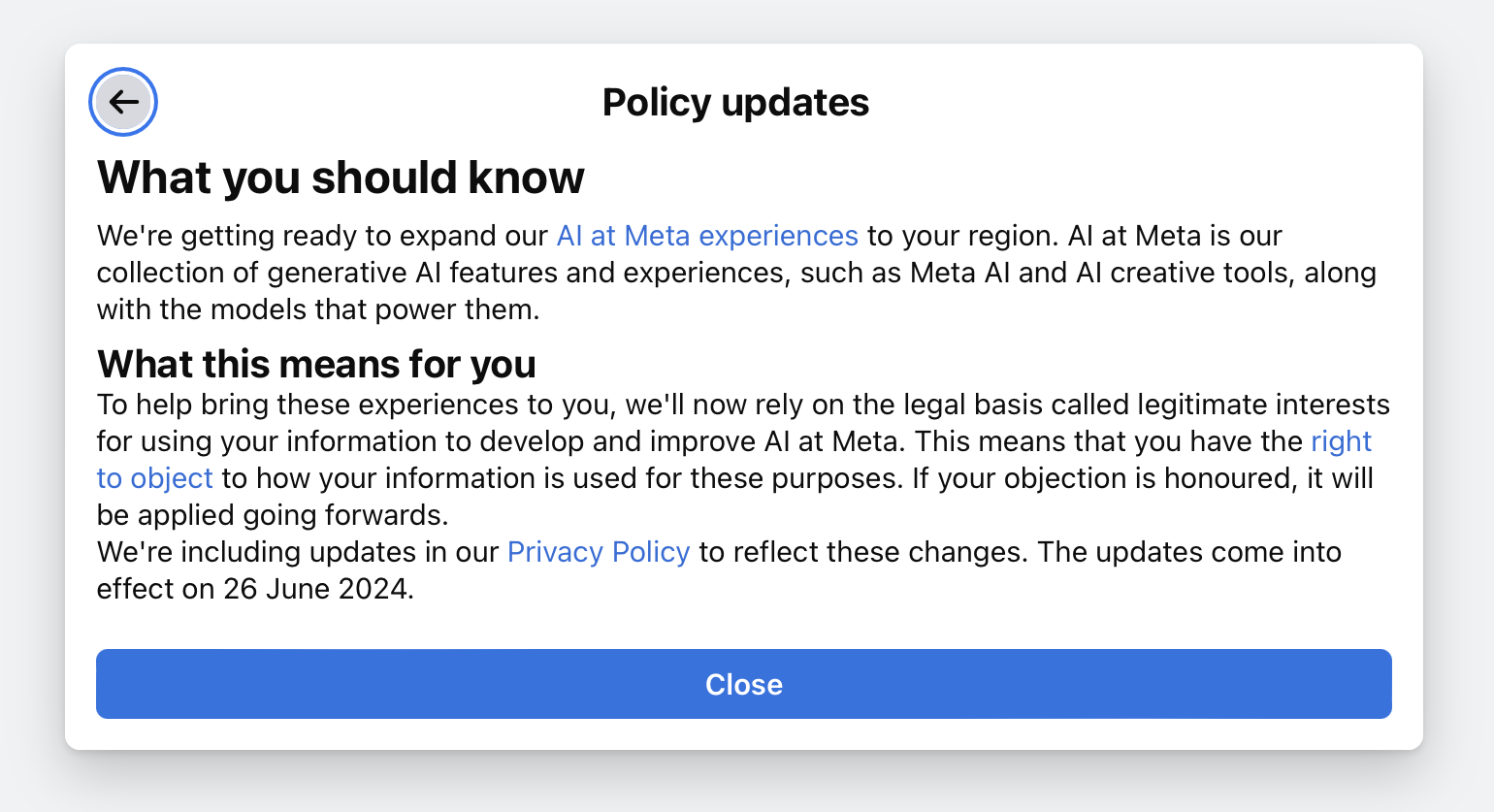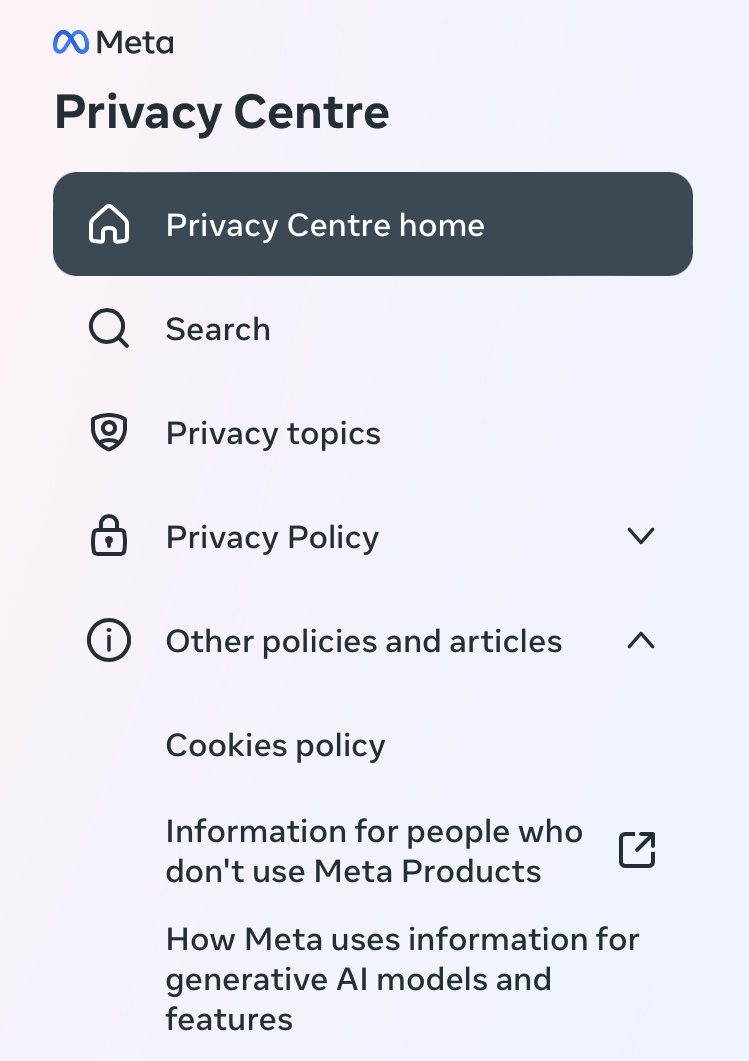Facebook wants to use YOUR content to train its AI—and you can’t opt out, if outside Europe
Posted on
by
Kirk McElhearn
![]()
Facebook has gone all-in on AI, with its in-house large language model Llama 3. But to train this model, they need to scrape content from Facebook and Instagram. When they tell you that they are planning to use your content to train their LLM, you can’t opt out. If you’re in the EU or the UK, you can request removal from the program. (And if you’re outside of Europe, you’re out of luck; Facebook doesn’t give you the option to opt out or request removal.)
Facebook started this process last year and is now rolling this out in other countries, including the UK where I live. Yesterday, a notification on Facebook led me to this screen:

“Legitimate interests”
Facebook says:
we’ll now rely on the legal basis called legitimate interests for using your information to develop and improve Al at Meta. This means that you have the right to object to how your information is used for these purposes. If your objection is honoured, it will be applied going forwards.
This means that you cannot opt out of Facebook and Meta using your content to train its AI tools. You can object to this, and Facebook alone decides if your objection is warranted.
The link in the above screen goes to this page, Object to Your Information Being Used for AI at Meta, where you can submit a form to “object to Meta using the information you’ve shared on our Products and services to develop and improve AI at Meta.”
Facebook says they use the following information from your account:
Information you’ve shared on our Products and services could be things like:
– Posts
– Photos and their captions
– The messages you send to an AI
The company claims that they don’t use “the content of your private messages with friends and family to train our AIs.”
You are required to fill out the form, and say “how this processing impacts you,” and to “provide any additional information that could help us review your objection.” But nothing on this form guarantees that Meta will accede to your demand; in fact, it suggests that opting out of the company using your data to train its AI may not be possible.
Not in Europe? No form for you
If you live in the US, you don’t have this option at all. Facebook simply says:
We are committed to being transparent about the legal bases that we use for processing information. We believe use of this information is in the legitimate interests of Meta, our users, and other people.
You may not have been notified about this change, even if it has rolled out to your country. You can check by going to Facebook’s Settings & Privacy, then Privacy Center. Click Other policies and articles, then click How Meta uses information for generative AI models and features.

From here, at the bottom of 1,200 words of legalese, you’ll find a link to the page mentioned above, Object to Your Information Being Used for AI at Meta, and you can make “requests related to your personal information from third parties being used to develop and improve AI at Meta” on this page AI at Meta Data Subject Rights. This latter page is about how Meta uses third-party data, which “includes what is publicly available on the internet and licensed information that someone else holds the rights to and gives Meta permission to use.” In other words, what they’ve scraped and what they’ve bought from other data brokers and other companies.
This overreach is not uncommon. As we know already, generative AI tools have been trained on all sorts of data, most of it publicly available, including much data under copyright. But what’s different here is that Meta is using data that is not public, but is in the walled garden of its platform. It’s no surprise, given how aggressive Facebook has been about collecting data and tracking users. But this wholesale collection of private data – you may have chosen to not make your Facebook profile may not be publicly accessible, and not available to those other than your Facebook friends – is extreme. (You can access these settings in Settings & Privacy > Privacy Center > Default Audience Settings.)
If Facebook reviews your request as a European resident
Shortly after I made the request to Facebook to be exempt from their AI data collection, I received the following reply:

So while opting out isn’t available in the Facebook settings, filling out this form seems to result in an automated acceptance of your choice. At least for now, this only seems to be the case in the EU and the UK.
It’s important for European residents to know that this possibility is available, and if you want your content to be excluded from Facebook’s AI training data, you should fill out the form on this page.
What can you do if you live outside of Europe?
Concerningly, that form isn’t available to you if you live outside of Europe. I checked with Intego’s Chief Security Analyst, Josh Long, who confirmed that the “right to object” form is not available to him as a California resident. We discussed this on episode 346 of the Intego Mac Podcast.
California was the first state in the U.S. to pass its own data privacy legislation that’s similar to Europe’s GDPR. The California Consumer Privacy Act (CCPA) should theoretically grant users the right to opt out or request removal from Meta’s AI training program. Other states have similar data protections; according to Bloomberg Law, four more have comprehensive data privacy laws that are currently in effect: Colorado, Connecticut, Utah, and Virginia. Ten other states have passed similar legislation that will take effect sometime between July 1, 2024 and January 1, 2026.
Intego has reached out to Meta to ask how users outside of Europe can request to have their data excluded from AI training. We will update this article if Meta responds.
If you don’t live in Europe, talk to your elected officials to make sure they’re aware of Facebook’s latest invasion of consumers’ privacy and their apparent lack of opt-out controls.
How can I learn more?
We discussed this story on episode 346 of the Intego Mac Podcast (click Play, then jump to 14:18):
Each week on the Intego Mac Podcast, Intego’s Mac security experts discuss the latest Apple news, including security and privacy stories, and offer practical advice on getting the most out of your Apple devices. Be sure to follow the podcast to make sure you don’t miss any episodes.
You can also subscribe to our e-mail newsletter and keep an eye here on The Mac Security Blog for the latest Apple security and privacy news. And don’t forget to follow Intego on your favorite social media channels: ![]()
![]()
![]()
![]()
![]()
![]()
![]()